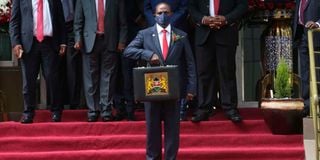Premium
Expert analysis: A budget during a perfect storm

Treasury Cabinet Secretary Ukur Yatani poses for a photo at Treasury House before leaving to Parliament buildings on June 10, 2020.
2021-2022 Budget: Govt seeks to fund deficit on shoulders of beleaguered taxpayers
The 2021-2022 Budget is perhaps one of the most difficult ones for Cabinet Secretary Ukur Yatani. The country has, like most parts of the world, been hit by a global pandemic the likes of which has not been seen for over a century.
Indeed, the entire world went into some form of lockdown during 2020 and some countries, including Kenya, are still in that mode.
Global economies have gone into recessions that have not been seen since the Great Depression of the 1930s.
In a world where everything is now so inter-connected, we have witnessed significant disruption of supply chains affecting imports and exports and a full-scale shutdown of industries, particularly in the tourism and hospitality sectors.
Healthcare infrastructure virtually everywhere collapsed under the pressure of an increasing number of Covid-19 patients, and shortages of ICU beds and oxygen became the norm.
Economic meltdown
During this time of economic meltdown (Kenya’s economy contracted by 2 per cent in 2020), tax revenues decreased and government debt increased. What did not reduce by any great amounts was recurring government expenditure, which served to widen the deficit.
A number of businesses were either on the brink of going down or collapsed and with that came higher unemployment and lower disposable income.
A perfect storm was what we found ourselves in and Mr Yatani was right in the midst of it in coming up with his proposals.
The general expectation was that we would see some major tax increases in the light of the above and in view of the renewed support from international financial institutions.
And yes, there were some of these in the Finance Bill. Interestingly, and perhaps fortunately for the taxpayer, it could have been much worse.
The major thrust of the tax proposals seems to be directed at administration and seeking to put a dampener on tax avoidance, particularly in respect of cross-border transactions.
This follows the global Base Erosion and Profit Shifting initiative that is designed to ensure that each jurisdiction receives its fair share of tax revenue on cross-border transactions.
While this is perhaps welcome, some of the measures announced - broader definition of control, restricting interest deductions and expanding the definition of permanent establishments, country by country reporting and common reporting standards - may go further than intended and Kenya may lose its competitive edge.
Increased taxation
Suffice to say there will be significantly more disclosure and reporting required and countries will now be exchanging information on taxpayers who are present, in some shape or form, in more than one jurisdiction.
If it helps catch the evaders, then we are probably on the right track, but hopefully not at the cost of increasing business for the honest amongst us!
So what’s in the budget for the average person? Well it is pretty much a mixture of the good, bad and ugly. There are some beneficial measures and others that are going to hurt our pockets with increased taxation.
Tax increases were expected given the current scenario of government spending but some of them do not seem logical, sensible or indeed fair when disposable incomes are already down.
Contributions towards the National Hospital Insurance Fund will become deductible for individuals under the proposals. While this will not be a significant saving, every shilling probably counts today.
The tax relief for employers who employ at least ten university graduates as apprentices has been widened to include those under technical and vocational education and to training graduates. This makes sense as the one area we were lacking in our education system is vocational training.
The shift of ordinary bread from being zero-rated to standard will result in an increase in the price of what is really a basic commodity. This change is strange, to say the least, when people are already seeing a reduction in their income.
The bill also proposes to change the basis of excise duty on motorcycles from a rate of Sh11,608 to an ad valorem rate of 15 percent, which may result in an increase in prices.
Certain jewellery and products containing nicotine or nicotine substitutes will also become more expensive with higher excise duty.
The gaming industry is targeted once again with 20 percent excise duty on the amount wagered or staked. This seems to be part of the general trend in the last few years of going after what has been, at least in the eyes of the government, a lucrative industry.
The cost of borrowing is likely to increase as processing fees become subject to 20 per cent excise duty.
In a nutshell, the 2021-2022 Budget is a mixed bag, with some gainers and some losers. The concern, though, is that the government is looking to finance its deficit through an already beleaguered taxpayer rather than look at controlling expenditure, which is really the crux of Kenya’s current financial turmoil.
Nikhil Hira is a director at Bowmans Kenya. The views expressed in this article are the author’s own and not necessarily those of the firm.




